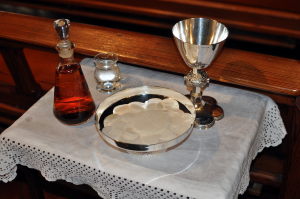
 OST OF US are at least passingly familiar with the practice of a choral offertory, of omitting an offertory hymn in favor of a “choir piece.” In parishes that have a tyranny of congregational singing, this can be the choir’s only time to exercise its ministry alone. Taking this practice to the next level and abandoning the congregational offertory altogether has, in my experience, been very effective.
OST OF US are at least passingly familiar with the practice of a choral offertory, of omitting an offertory hymn in favor of a “choir piece.” In parishes that have a tyranny of congregational singing, this can be the choir’s only time to exercise its ministry alone. Taking this practice to the next level and abandoning the congregational offertory altogether has, in my experience, been very effective.
In my experience, most parishes have some form of the “four-hymn sandwich.” Whether these are hymns in the traditional strophic sense, or other songs that have been plugged in to fill musical slots in the liturgy is irrelevant. There exist 4 main places for the congregation to sing, and darn it, they will sing. This has been the case in most parishes where I have served, as well.
Many times on this blog, we have discussed that singing at Mass and congregational participation not only extends beyond the 4-Hymn Sandwich, but should look quite different indeed. When everyone sings together the typical four hymns, plus the Mass ordinary, plus the dialogues (ideally!), that is quite a bit of singing. Maybe we need to get a chance to catch our collective breaths and pray. Maybe even listen.
It is important to recognize when in the liturgy the music is part of the action, accompanying the action, and when it IS the action. During the Gloria, for example, the music IS the action. During the processional, the introit is part of the action. Unless you are singing the proper (in which case you hardly need my advice), during the offertory, the music is accompanying the action. What is happening is a combination of housekeeping and preparatory prayers for the Liturgy of the Eucharist. I have always thought that insisting on a congregational song at this time feels a bit like “busy work.” We are being given something to do to keep us entertained while the other stuff happens up there. The music is hardly an engagement with the liturgical action.
In my experience, a choral offertory does well here. This is an opportunity for the choir to sing its more challenging repertoire without pushing aside congregational singing at other moments of the liturgy. But let’s be honest: how many of us have choirs at every single Mass on a weekend? No, you don’t. You have one choir Mass, maybe two if you have different groups, and that’s it. We’re right back to the musical wallpaper for the other Masses.
When I arrived here at the Cathedral in Indianapolis, they had an interesting and long-standing (read: at least 25-30 year) tradition of not having a congregational offertory. Either the choir sings, or the organ plays. I thought this an odd practice, but it just works. The break in song gives everyone a chance to catch their breaths and prepare themselves for the coming rites. I like it. Besides, you know that on any given Sunday, you can find about 2 hymns, maybe 3, that really fit well with the celebrated feast. That fourth one is almost always a stretch. So don’t do it. Play the organ or have the choir sing.
Bonus: during Lent, when the choir isn’t singing, I don’t use the organ for solo work, per the GIRM. This is a good time to introduce the oft-neglected Offertory Antiphons, starting with a simpler source like the Lalemont Gradual or the Simple English Propers. I have gotten a fantastic response from these.
If you sing the dialogues and the ordinary, as well as a hymn at the end and perhaps the beginning of Mass, that is plenty of singing for the average congregation. Not only will most people not miss it, but many will be relieved to not sing one more thing at the Offertory, especially if it’s just busy work.

